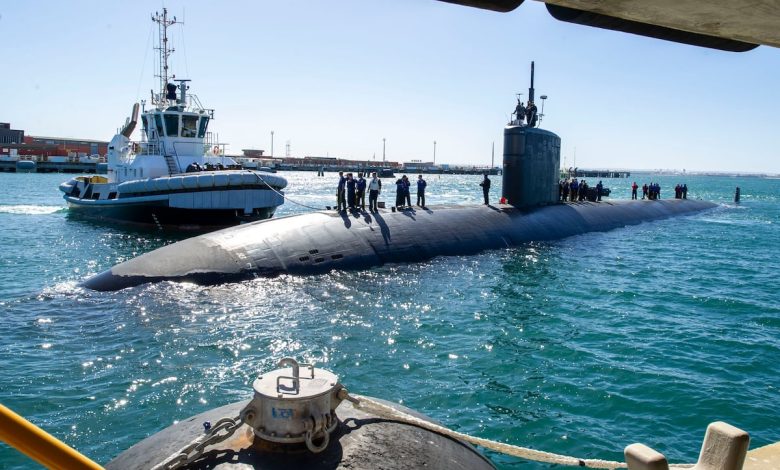Pentagon to review AUKUS submarine deal with Australia and Britain

“The Department is reviewing AUKUS as part of ensuring that this initiative of the previous Administration is aligned with the President’s America First agenda,” a Pentagon spokesperson wrote in a statement Wednesday.
The spokesperson did not say who was involved in the effort, when it would conclude or why it was initiated — except to say that the Pentagon was concerned about the readiness of its forces and the U.S. defense industry.
“This review will ensure the initiative meets these common sense, America First criteria,” the statement continued.
RELATED
The Financial Times first reported news of the review.
As part of the trilateral defense pact, Britain and Australia will build a nuclear-powered submarine, with the United States selling Virginia-class boats to Canberra in the interim. The agreement also includes a separate goal for the three countries to develop advanced technology together, such as quantum computing and hypersonic missiles.
U.S. Defense Secretary Pete Hegseth traveled to Singapore just over a week ago, where he met with his Australian counterpart, Richard Marles, multiple times. In a major speech on the Trump administration’s Asia policy, Hegseth didn’t mention AUKUS, something Marles dismissed in an interview with Defense News later.
“We’ve spoken extensively about AUKUS — both of our countries, including Secretary Hegseth himself. We don’t feel a need to keep reiterating it on every single occasion,” Marles said, arguing the program was “on track.”
“If we can produce the attack submarines in sufficient number and sufficient speed, then great. But if we can’t, that becomes a very difficult problem because we don’t want our servicemen and women to be in a weaker position,” Colby said.
“It should be the policy of the United States government to do everything we can to make this work,” Colby continued.
Colby has also argued that Australia, which is increasing defense spending to around 2.4% of GDP by the mid-2030s, should raise its defense budget far faster. In a Pentagon readout after Hegseth and Marles met, the U.S. said it wanted that number to be 3.5% of GDP.
In April, the head of U.S. Indo-Pacific Command, Adm. Samuel Paparo, defended the initiative’s value in testimony before the House and said the effort on nuclear submarines was “meeting every milestone” operationally.
“AUKUS delivers something to INDOPACOM that is critical and could be a key advantage, and that is a Indian Ocean submarine base. This gives us faster response time to the South China Sea than in Hawaii, in Washington, in San Diego,” Paparo said.
To help America build more submarines, Congress has spent billions of dollars in recent defense bills targeted at the effort. Australia, too, has pledged $3 billion in its own funding to help the U.S. build more of the boats, which Marles referenced in his interview with Defense News.
“It is a challenge, but I think it’s a challenge we can meet,” he said.
The Australian embassy didn’t immediately respond to a request for comment.
A spokesperson for the British embassy, meanwhile, responded to the news with reassurance.
“It is understandable that a new administration would want to review its approach to such a major partnership, just as the U.K. did last year.”
Senate Democrats criticized the White House for casting doubt on the future of the AUKUS agreement.
“If this administration is serious about countering the threat from China — like it has said as recently as this morning — then it will work expeditiously with our partners in Australia and the U.K. to strengthen this agreement and ensure we are taking steps to further boost our submarine industrial base,” Sen. Tim Kaine, D-Va., said in a statement.
“Anything less would play directly into China’s hand.”
Fellow Senate Armed Services Committee member Jeanne Shaheen, D-N.H., said the news that Trump may abandon AUKUS “will be met with cheers in Beijing” and further weaken America’s standing in the world.
“At a moment when we face mounting threats from [China] and Russia, we should be encouraging our partners to raise their defense spending and partnering with them on the latest technologies — not doing the opposite,” she said.
Military Times reporter Leo Shane III contributed to this story.
Noah Robertson is the Pentagon reporter at Defense News. He previously covered national security for the Christian Science Monitor. He holds a bachelor’s degree in English and government from the College of William & Mary in his hometown of Williamsburg, Virginia.
Read the full article here






![Tom Fuller: How an End-of-Times Mindset Changed the Long-Range Game [ZEROED IN] Tom Fuller: How an End-of-Times Mindset Changed the Long-Range Game [ZEROED IN]](https://i3.wp.com/www.recoilweb.com/wp-content/uploads/2025/09/Tom-Fuller-Interview-1.jpg?w=390&resize=390,220&ssl=1)


